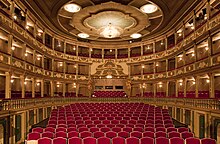The Erlangen Theater
The Erlangen Theater is a spoken theater in Erlangen . The venues are the Markgrafentheater , the studio stage in the theater in the garage and the Erlangen traditional cinema "Glocken-Lichtspiele".
program
There are 260 performances, around 15 premieres and numerous revivals per season. The program ranges from classics to contemporary pieces and “extra” events such as readings, foyer talks, matinees and panel discussions. The program is supplemented by guest performances by other theaters and pop concerts in cooperation with E-Werk.
The overall program is rounded off by a wide range of activities for children and young people. The Erlangen Theater offers a theater education program for every age group and school type. Once a year there is also the Erlangen School Theater Days for children and young people, at which the Erlangen schools and their theater groups show their own productions.
The Erlangen Theater has its own ensemble, which includes between 8 and 10 actors.
Venues
Margrave Theater
The “Opera and Comedy House” was built from 1715 to 1718 on behalf of Margrave Georg Wilhelm von Brandenburg-Bayreuth and inaugurated in 1719 with the opera “Argenis and Poliarchus”. From 1740 to 1743 the auditorium was redesigned by the Italian theater architect Paolo Gaspari on behalf of Margravine Wilhelmine von Bayreuth and reopened in 1744 for the play "Sirace, a musical drama".
From 1906 to 1913 the non-profit association arranged guest performances by the Intimate Theater Nuremberg and the City Theater Bamberg , in 1924 relations with the Nuremberg City Theater were resumed. The Bamberg City Theater, however, had its theater life in Erlangen from 1926 to 1933. In 1934 the non-profit association had to transform itself into the “Deutsch Bühne, Ortsgruppe Erlangen eV”. In 1936 this became "The National Socialist Cultural Community, Local Association Erlangen eV", whose inheritance was finally taken in 1937 by the Nazi community " Strength through Joy ".
Under the direction of Probst and the artistic director Doerner, a separate theater company was founded in 1945. After the currency reform in 1949, the economic prerequisites for a separate ensemble could no longer be maintained, so that from autumn 1949 regular guest performances took place on the Nuremberg theaters. In 1973 a separate urban ensemble was rebuilt. In the years from 1980 to 2000 there were extensive renovations, the renovation in accordance with the applicable safety standards and the improvement of the air conditioning technology, and in 2011 an extensive fire protection renovation was carried out.
Theater in the garage
The theater in the garage was opened as a theater in 1975 as a result of a student movement and was extensively modernized in 1989. Today it serves as a small studio stage with 82 seats. The theater café is connected to it.
Bell light plays
The bell lights come from the 1920s. The cinema is one of the first in Erlangen . In 1996 "the bells" had to stop operating. Now the premises serve the theater as a rehearsal stage and are also used as an event location for individual productions.
Previous directors were:
- Manfred Neu (1975–1989, theater in the garage)
- Andreas Hänsel (1989–1998)
- Hartmut Henne (1998-2001)
- Johannes Blum (interim director 2001–2002)
- Sabina Dhein (2002-2009)
- Katja Ott (since 2009)



